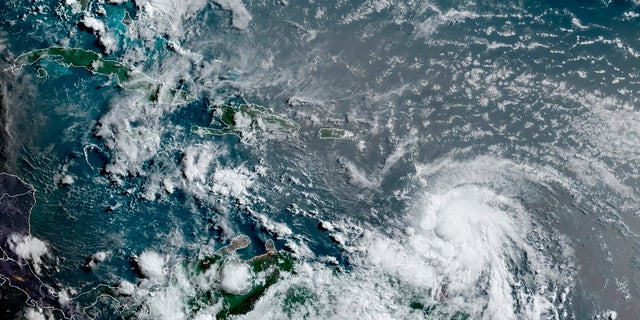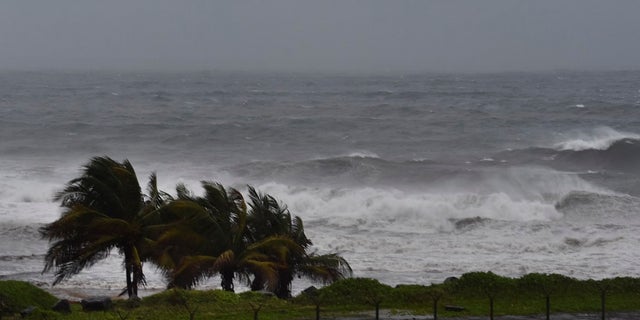Elsa strengthened into the first hurricane of the Atlantic season on Friday as it battered the eastern Caribbean, where officials closed schools, businesses and airports, and it appears headed eventually for Florida.
The Category 1 storm unleashed heavy rains and winds on Barbados and then on St. Vincent and the Grenadines, which are struggling to recover from recent massive volcanic eruptions.
Elsa was located about 5 miles north of St. Vincent and was moving west-northwest at 29 mph. It had maximum sustained winds of 75 mph, according to the National Hurricane Center in Miami.
HURRICANE HUNTERS HEAD TO SOUTH CAROLINA ON STORM RECON MISSION

This satellite image provided by the National Oceanic and Atmospheric Administration shows Hurricane Elsa moving through the Caribbean, over Barbados. Elsa was expected to pass near the southern coast of Hispaniola on Saturday and to move near Jamaica and portions of eastern Cuba on Sunday. (NOAA/NESDIS/STAR GOES via AP)
"That level of sustained wind can blow down a lot of buildings and cause a lot of damage," said St. Vincent Prime Minister Ralph Gonsalves. "I am pleading with you. Let us not take this hurricane lightly. This is not the time to play the fool."
A hurricane warning was in effect for St. Lucia, St. Vincent and the Grenadines, as well as southern Haiti from the capital, Port-au-Prince, to the southern border with the Dominican Republic.
The long-term track showed the fast-moving storm rolling toward Hispaniola, the island shared by Haiti and the Dominican Republic, as a hurricane before weakening back to tropical storm force and potentially heading to Florida by early Tuesday.
Authorities opened dozens of shelters in St. Vincent and urged people to evacuate if they lived near a valley, given the threat of flash flooding, mudslides and lahars, especially in the northern part of the island where La Soufrière volcano is located.
"Do not wait until it's too late to go to a shelter," Gonsalves said.
He said 94 shelters are open, a smaller number than in previous years because some 2,000 people remain in other shelters following massive volcanic eruptions that began in early April.

Hurricane Elsa approaches Argyle, St. Vincent on Friday. (AP Photo/Orvil Samuel)
A hurricane watch was issued for Jamaica and the south coast of the Dominican Republic from Punta Palenque to the border with Haiti.
Elsa is the earliest fifth-named storm on record, beating out last year’s Eduardo which formed on July 6, according to Colorado State University hurricane researcher Phil Klotzbach. He also noted that it's the farthest east that a hurricane has formed this early in the tropical Atlantic since 1933. The 1991-2020 average date for the first Atlantic hurricane formation is mid-August.
The storm was forecast to bring 3 to 6 inches of rain with maximum totals of 10 inches on Friday across the Windward and southern Leeward Islands. The rain could unleash isolated flash flooding and mudslides.
The storm strengthened to hurricane status on the same day that the death toll in the Surfside condo collapse rose to 20. Surfside, which is located in South Florida, could see severe weather from Hurricane Elsa, further complicating search and rescue efforts.
CLICK HERE TO GET THE FOX NEWS APP
Rescue efforts were temporarily halted earlier in the week amid concerns that the part of the building that did not collapse could also come down. The search resumed Thursday. Hours later, first responders recovered two more bodies, one of whom was the daughter of the firefighter who found her body.
President Biden and first lady Jill Biden visited the site of the destruction on Thursday to grieve with families. Gov. Ron DeSantis has also been on site.
Fox News' Jon Street, Janice Dean and The Associated Press contributed to this report.
World - Latest - Google News
July 03, 2021 at 02:16AM
https://ift.tt/3qKj07J
Elsa strengthens to hurricane status, further complicating condo collapse search efforts - Fox News
World - Latest - Google News
https://ift.tt/2SeTG7d
Bagikan Berita Ini














0 Response to "Elsa strengthens to hurricane status, further complicating condo collapse search efforts - Fox News"
Post a Comment